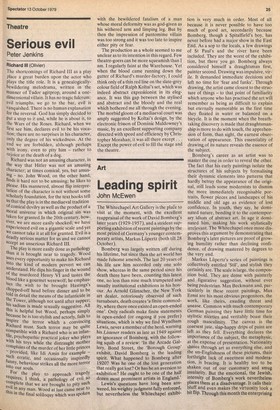Theatre
Serious evil
Peter Jenkins
Richard ill (Olivier) The shortcomings of Richard III as a play Place a great burden upon the actor who plays the title role. It is a genealogicallybewildering melodrama, written in the manner of Tudor agitprop, around a onedimensional villain, It has no tragic fulcrum: evil triumphs, we go to the bar, evil is vanquished. There is no human explanation for the reversal. God has simply decided to Put a stop to it and, while he is about it, to the Wars of the Roses. Richard, when we first see him, declares evil to be his vocation; there are no surprises in his character, only the degree of his wickedness. At the end we are forbidden, although perhaps With irony, even to pity him — rather to rejoice at the death of a dog. Richard was not an amusing character, in the way that Hitler was not an amusing Character; at times comical, yes, but amusing — no. John Wood, on the other hand, finds it hard not to be amusing; he likes to Please. His mannered, almost flip interpretation of the character is not without some scholarly foundation, for the text books tell US that the play is in the mediaeval tradition of comical devilry as well as the product of a moral universe in which original sin was taken for granted. In the 20th century, however, we are more easily shocked; we have experienced evil on a gigantic scale and yet 'we cannot take it at all for granted. Evil is a deadly serious matter for us and we cannot accept an unserious Richard III, The play is more easily done as pathology than it is brought near to tragedy. Wood uses every opportunity to make his Richard into the kind of modern pervert we can Understand. He dips his finger in the wound of the murdered Henry VI and tastes the blood like a gourmet werewolf; he emphasises the wish to be brought Hastings's chopped-off head before dinner and to be told in detail the means of the infanticide in the Tower, although not until after supper; his sadism is made sexually suggestive. All this is helpful but Wood, perhaps simPlY because he is too stylish and actorly, fails to inspire the terror which a convincing Richard must. Such terror may be quite compatible with a Richard who is an infantile, psychopathic practical joker who plays With his toys while the distraught mother complains of the murder of her little princes — provided, like Idi Amin for example — such erratic, and occasionally insPiredlY funny, behaviour strikes all the more terror into our souls. For the play to approach tragedy requires, I think, a pathology of evil so complete that we are brought to pity such evil in any man. Wood at last came near to this in the final soliloquy which was spoken with the bewildered fatalism of a man whose moral deformity was as god-given as his withered arm and limping leg. But by then the impression of pantomime villain was too strong and it was too late to inspire either pity or fear.
The production as a whole seemed to me unclear as to its intention in this regard. Few theatre-goers can be more squeamish than I am. I regularly faint at the Warehouse. Yet when the blood came running down the gutter of Richard's murder-factory, I could think only of a thin red line on the slate-grey colour field of Ralph Koltai's set, which was indeed abstract expreisionist in its elegance. It was this gap between the stylised and abstract and the bloody and the real which bothered me all through the evening, The morbid gloom of a mediaeval court was amply suggested by Ko'tars design, by the electronic frisson of Dominic Muldowney's music, by an excellent supporting company directed with speed and efficiency by Christopher Morahan; it was all there except . . Except the power of evil to fill the stage and the theatre.


































 Previous page
Previous page